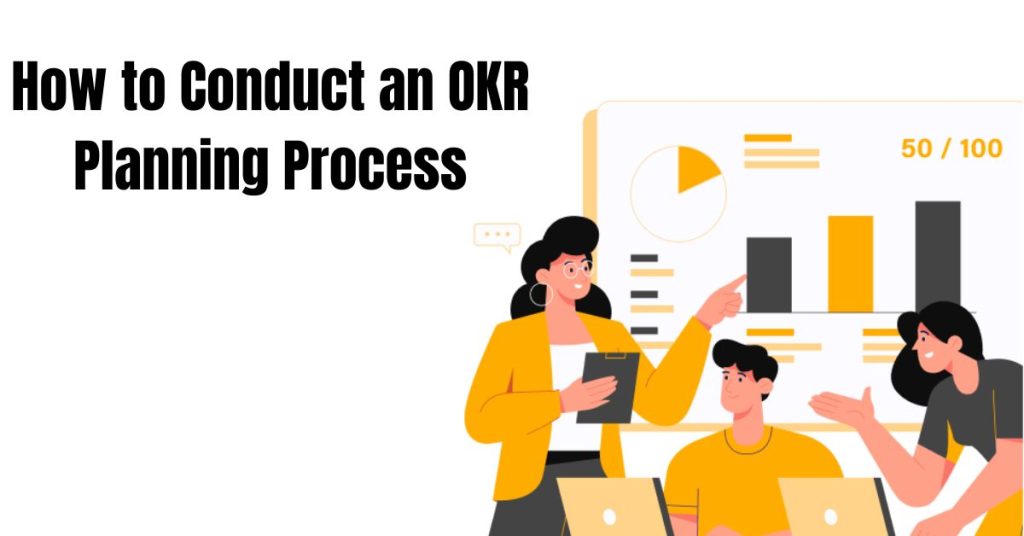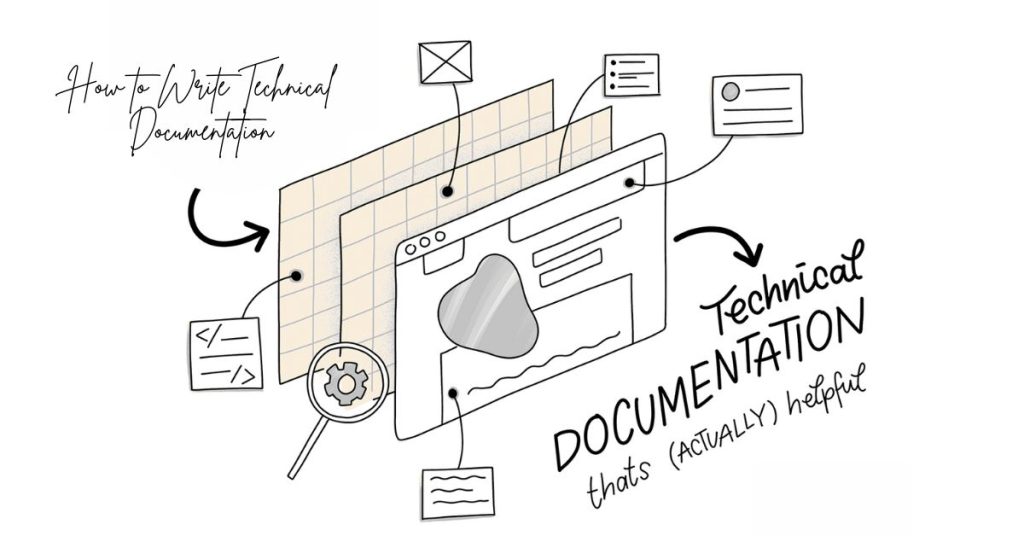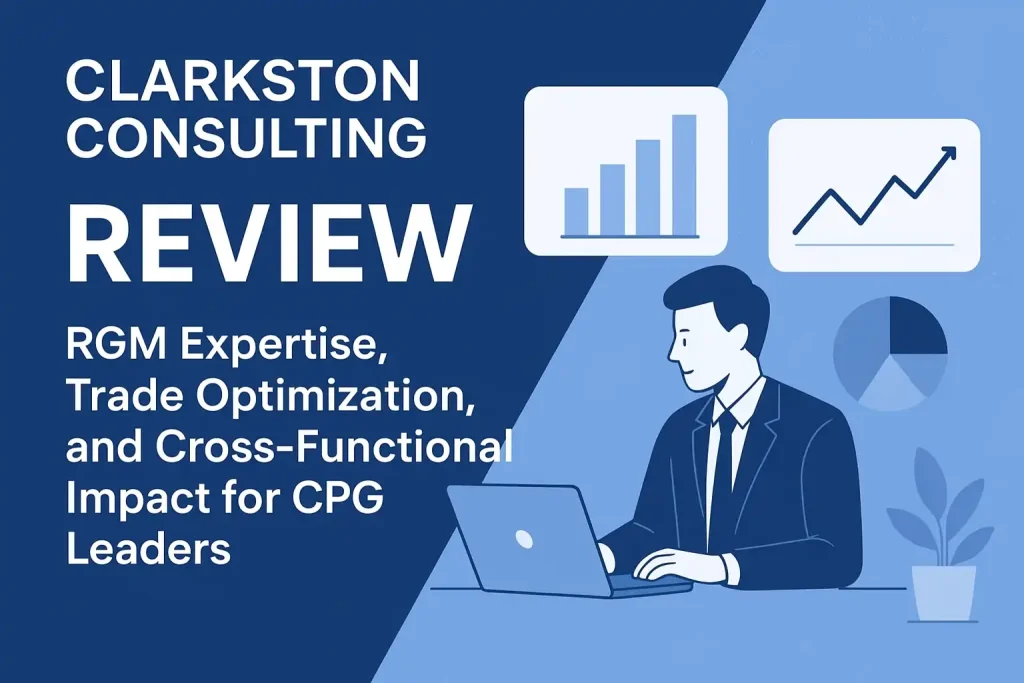Time is one of the most precious assets we have, yet it’s often the hardest to manage. For busy individuals, finding a balance between work, personal life, and daily responsibilities can feel overwhelming. That’s where time management books come in.
These books are more than just guides—they offer proven methods, practical tips, and powerful insights to help you take control of your schedule. Whether you’re a professional, student, entrepreneur, or parent, the right book can shift your mindset, boost productivity, and reduce stress.
In this blog, we’ve rounded up the 10 best time management books for 2025. Each one is packed with strategies to help you use your time wisely and get more done without burning out. If you’re ready to focus on what really matters and make the most of every minute, this list is for you.
1. Organize Tomorrow Today: 8 Ways to Retrain Your Mind to Optimize Performance at Work and in Life
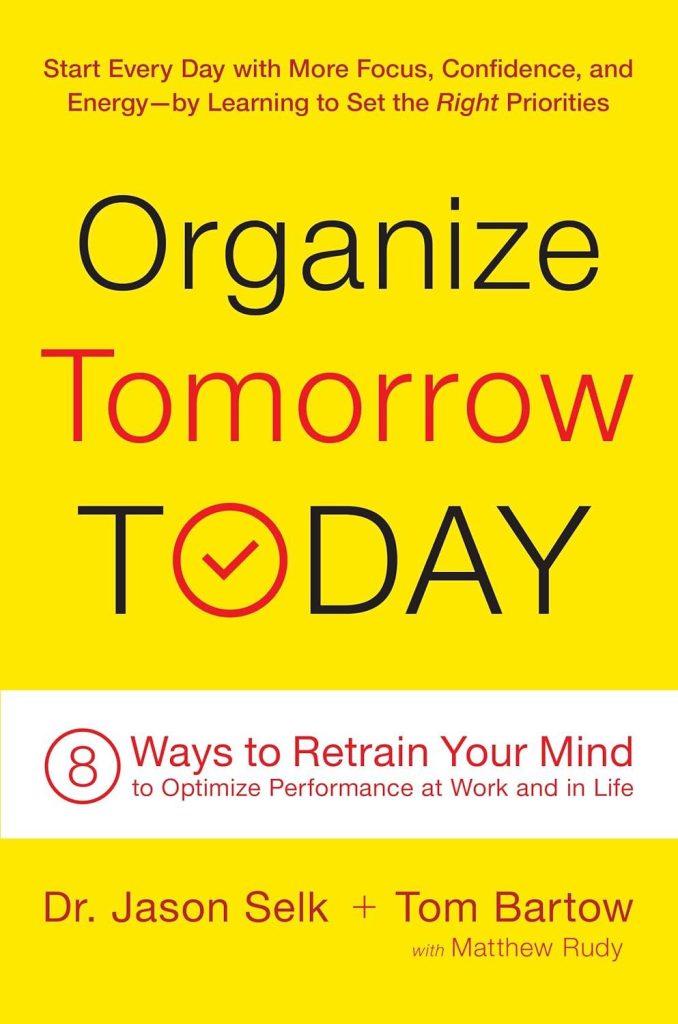
By Jason Selk, Tom Bartow, and Matthew Rudy
About the Book
Organize Tomorrow Today is a practical, science-backed guide that focuses on mental training and high-performance habits. The authors—experts in sports psychology and coaching—introduce eight simple yet powerful strategies designed to help you take control of your day before it even begins. The book blends real-world examples with actionable techniques to boost your productivity, performance, and clarity.
Instead of overwhelming readers with complicated plans, the book promotes small, consistent habits that compound over time. It’s perfect for anyone looking to make real improvements in both personal and professional life.
Key Takeaways from This Book
Identify and prioritize the most important task each day
Focus on improvement, not perfection
Establish a nighttime routine to win tomorrow today
Use accountability partners to stay on track
Develop mental toughness by managing self-talk and confidence
Simplify your goals and break them into daily actions
Build better habits by staying consistent
Replace multitasking with laser-sharp focus on one task at a time
How This Book Is Effective for Time Management
This book helps you take control of your day before it starts. By learning how to mentally prepare the night before, you waste less time figuring out what to do in the morning. The focus on one meaningful task per day cuts through the clutter and gives your day a clear purpose. It’s ideal for anyone who feels stretched thin and wants a practical, no-fluff approach to better time use.
2. The 7 Habits of Highly Effective People: Powerful Lessons in Personal Change
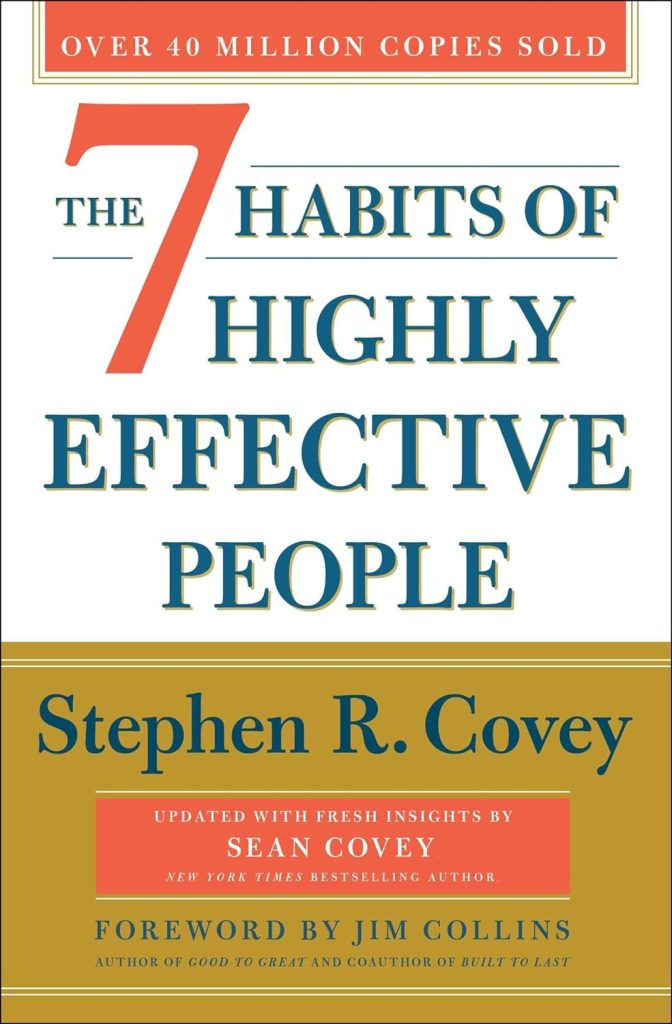
By Stephen Covey
About the Book
A timeless classic, The 7 Habits of Highly Effective People has transformed the lives of millions. Stephen Covey presents a principle-centered approach to solving personal and professional problems. The book outlines seven core habits that help individuals become more proactive, purpose-driven, and productive.
Rather than offering quick fixes, Covey focuses on character development, long-term growth, and aligning actions with core values. The result? A more structured, balanced, and meaningful way to manage your time and life.
Key Takeaways from This Book
Be proactive: Take responsibility for your time and actions
Begin with the end in mind: Define clear goals and outcomes
Put first things first: Prioritize tasks that truly matter
Think win-win: Build positive relationships that support your time goals
Seek first to understand, then be understood: Communicate effectively and save time on misunderstandings
Synergize: Collaborate better by valuing diverse strengths
Sharpen the saw: Regularly renew yourself to maintain high performance
How This Book Is Effective for Time Management
Covey’s third habit—Put First Things First—is a cornerstone of effective time management. He introduces the Time Management Matrix, helping readers distinguish between what’s urgent and what’s important. This approach teaches you to focus more on long-term goals rather than reacting to constant distractions. The book gives you a framework to align your daily actions with your deeper mission, saving time and increasing fulfillment.
3. The 80/20 Principle: The Secret to Achieving More with Less
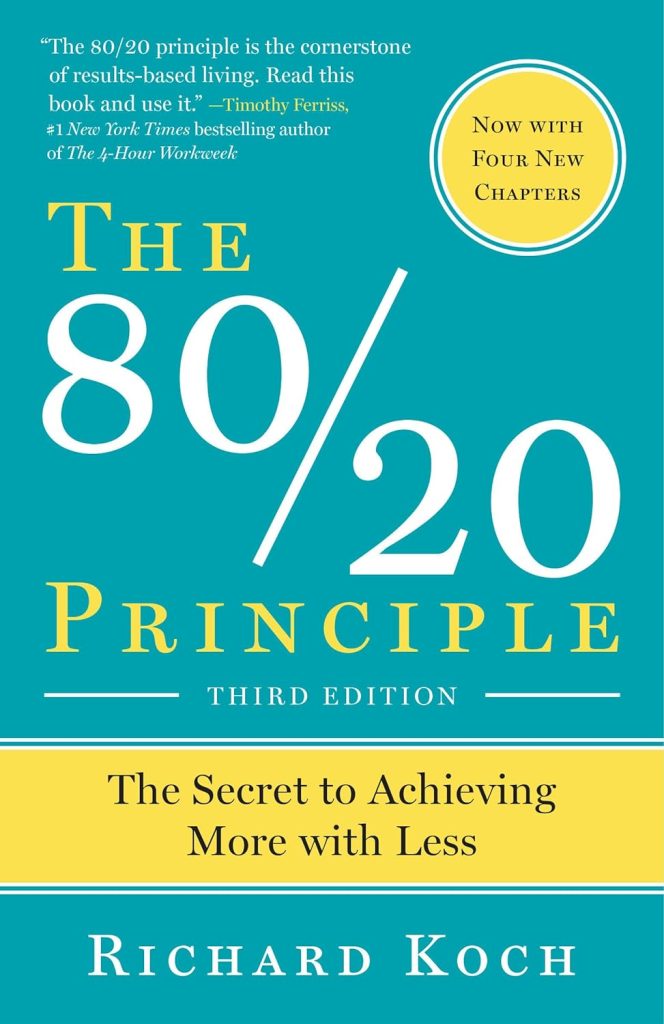
By Richard Koch
About the Book
The 80/20 Principle explores the idea that 80% of results come from just 20% of efforts. Richard Koch applies this concept to time, productivity, business, and life in general. His message is simple but profound—focus your energy on what truly moves the needle and let go of the rest.
With examples from business, economics, and daily life, the book challenges you to rethink how you spend your time and what you prioritize. It’s a guide to working smarter, not harder.
Key Takeaways from This Book
Identify the 20% of tasks that yield 80% of your success
Eliminate or delegate the low-value 80% of activities
Stop trying to do everything—focus on fewer, higher-impact tasks
Simplify your schedule and commitments
Apply the 80/20 rule to personal life, not just business
Leverage your strengths and passions for greater efficiency
Create space in your life by doing less but achieving more
How This Book Is Effective for Time Management
This book teaches you to stop being busy and start being effective. By identifying what activities bring the greatest return on your time, you can focus more sharply and cut out unnecessary work. The 80/20 principle is a game-changer for anyone drowning in to-do lists and looking for a more minimalist, impactful approach to time management.
4. Eat That Frog!: 21 Great Ways to Stop Procrastinating and Get More Done in Less Time
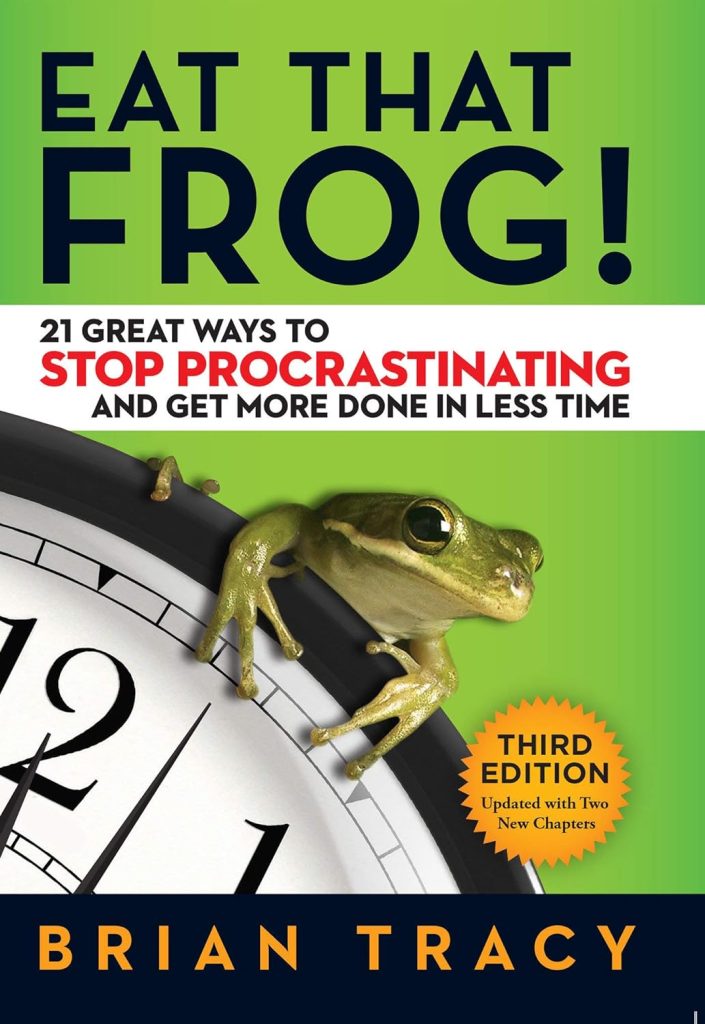
By Brian Tracy
About the Book
Eat That Frog! is a short, action-oriented book focused entirely on one common issue—procrastination. Brian Tracy draws inspiration from a Mark Twain saying: “Eat a live frog first thing in the morning and nothing worse will happen to you the rest of the day.” In other words, tackle your most difficult or important task first.
The book offers 21 practical techniques to help you overcome delay, get more organized, and work smarter. It’s packed with simple steps and clear advice designed for people who want to stop wasting time and start making progress.
Key Takeaways from This Book
Identify your “frog”—your biggest, most important task
Tackle high-value tasks first each day
Use the ABCDE method for task prioritization
Apply the 80/20 Rule to choose high-impact work
Break large tasks into smaller steps to reduce overwhelm
Set clear deadlines to avoid indecision
Develop a sense of urgency and self-discipline
How This Book Is Effective for Time Management
This book is a classic for anyone struggling with putting things off. It helps eliminate decision fatigue by giving you a clear strategy: do the hardest, most impactful task first. This habit alone can transform your productivity. Its bite-sized chapters make it an easy read, and every strategy is immediately actionable—perfect for busy individuals with limited time.
5. Getting Things Done: The Art of Stress-Free Productivity
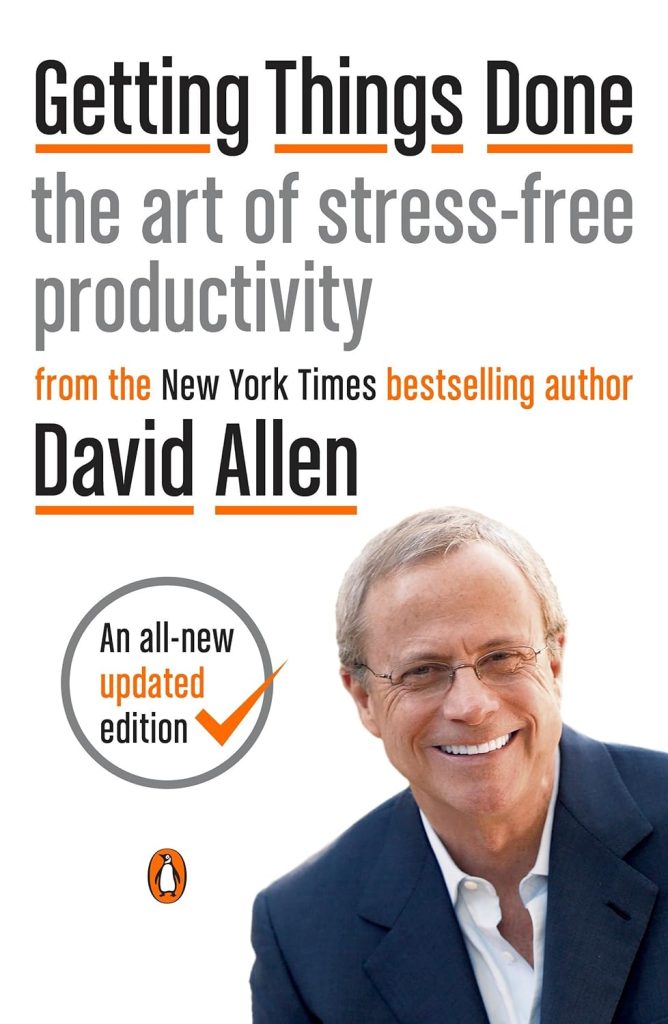
By David Allen
About the Book
David Allen’s Getting Things Done (often referred to as GTD) has become a cornerstone in productivity literature. The book lays out a complete system to help you capture, organize, and execute tasks without feeling overwhelmed. The key principle? Your brain is for having ideas, not holding them.
Allen introduces a workflow for clearing mental clutter and organizing commitments into an external system, allowing for clearer thinking, better focus, and less stress.
Key Takeaways from This Book
Capture everything—tasks, ideas, responsibilities—outside your head
Clarify the next physical action for each task
Organize tasks by context and priority
Review your system weekly to stay on track
Trust your system so your mind can relax and focus
Use the “Two-Minute Rule” to clear small tasks immediately
Separate planning from doing to avoid confusion
How This Book Is Effective for Time Management
GTD is more than a to-do list—it’s a full productivity system. By helping you empty your mind and organize all responsibilities into a trusted structure, it reduces mental overload. You’ll spend less time worrying about what you forgot and more time doing what matters. It’s especially helpful for busy professionals managing multiple projects, meetings, and priorities.
6. The Productivity Project: Accomplishing More by Managing Your Time, Attention, and Energy
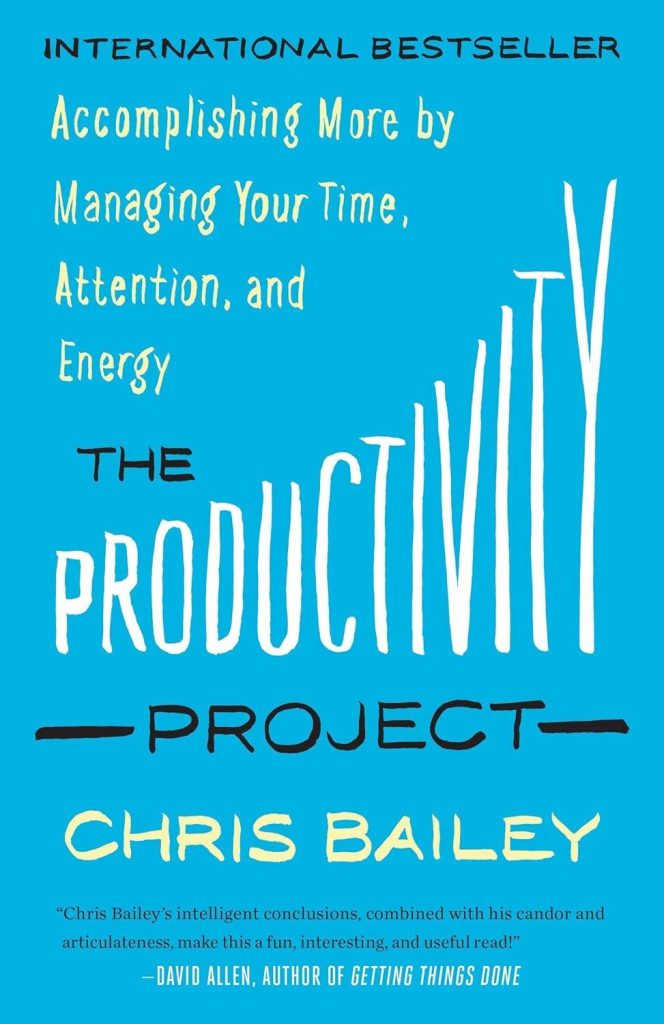
By Chris Bailey
About the Book
In The Productivity Project, Chris Bailey shares lessons learned from a year-long experiment where he tested every productivity tip, method, and hack he could find. This book is a mix of personal stories, science-based insights, and honest reflections on what truly boosts productivity—and what doesn’t.
Instead of focusing only on time, Bailey explores how managing attention and energy is just as important for getting things done.
Key Takeaways from This Book
Productivity is about managing time, attention, and energy together
Tackle your most important task during your peak energy hours
Schedule less and focus more deeply on fewer tasks
Avoid distractions by turning off digital notifications
Take frequent breaks to recharge your mental energy
Experiment to find what works for you—productivity is personal
Working more doesn’t always mean achieving more
How This Book Is Effective for Time Management
Chris Bailey’s book stands out because it looks beyond the clock. It teaches you how to optimize when and how you work, not just what you work on. If you often feel drained or scattered despite working long hours, this book will help you get more done by aligning your schedule with your energy and focus levels. It’s practical, relatable, and especially relevant in today’s distracted world.
7. Make Time: How to Focus on What Matters Every Day
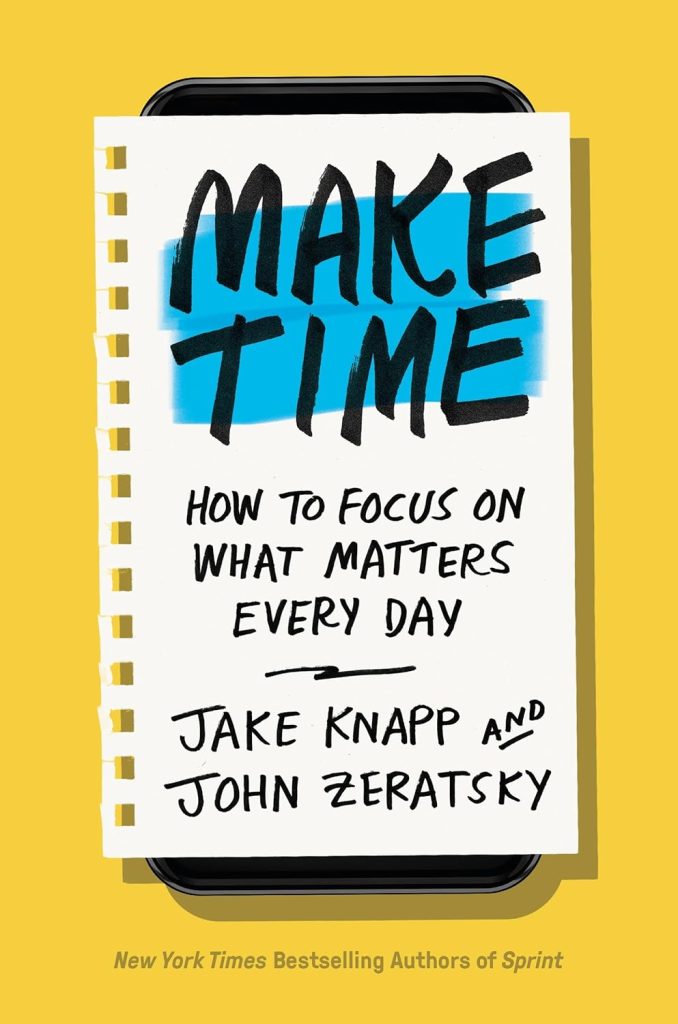
By Jake Knapp and John Zeratsky
About the Book
Make Time is a refreshing and flexible guide to reclaiming your focus in a fast-paced, distraction-heavy world. Written by two former Google designers, the book offers a customizable framework that helps you prioritize your time around what truly matters each day.
Instead of rigid schedules, the authors present four daily steps: Highlight, Laser, Energize, and Reflect. These concepts are paired with over 80 actionable tactics that you can test and adapt to your lifestyle. It’s ideal for people overwhelmed by technology, social media, and endless to-do lists.
Key Takeaways from This Book
Choose one highlight task each day that matters most
Design your day to focus on that task with fewer distractions
Use tactics like time blocking, distraction removal, and intentional breaks
Make small lifestyle adjustments to boost energy and focus
Track what works and adjust over time through daily reflection
Embrace flexibility—there’s no one-size-fits-all routine
Technology should serve you, not control your time
How This Book Is Effective for Time Management
Make Time helps you break free from busyness and take control of your attention. Its simple approach makes it easy to integrate into any lifestyle. By focusing on just one meaningful task per day, the book reduces overwhelm and helps you feel accomplished even on hectic schedules. It’s perfect for anyone seeking balance between productivity and mindfulness.
8. Deep Work: Rules for Focused Success in a Distracted World
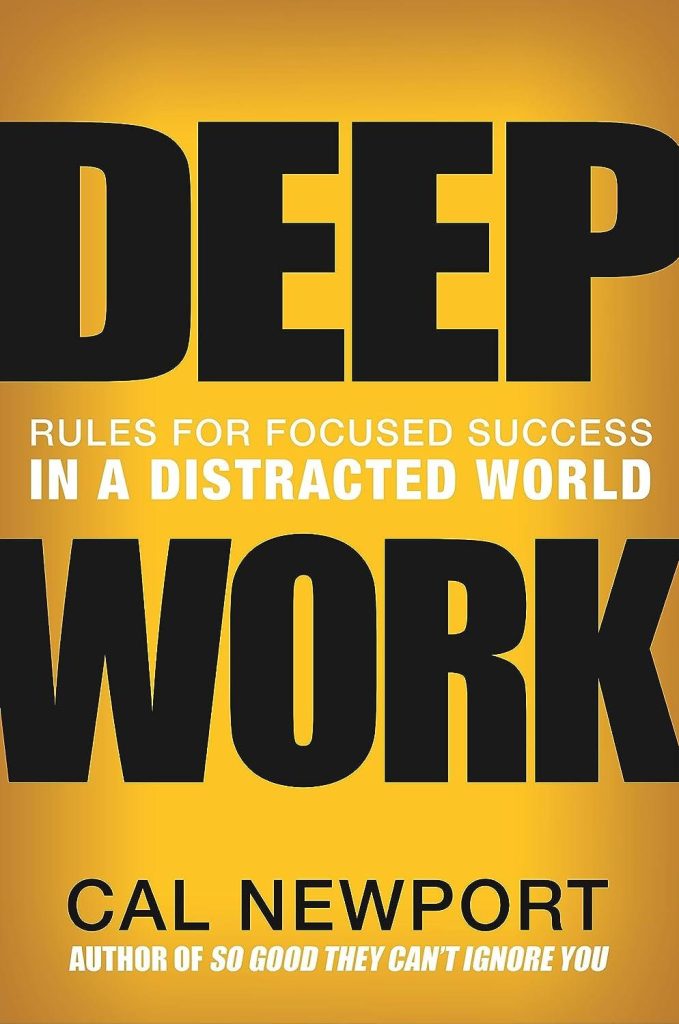
By Cal Newport
About the Book
In Deep Work, Cal Newport introduces the idea that the ability to focus without distraction on a cognitively demanding task is one of the most valuable skills in the modern economy. He contrasts “deep work” with “shallow work”—the emails, messages, and low-value tasks that fill our days—and provides strategies to reclaim focus.
The book is both a call to action and a manual for cultivating deep, meaningful concentration in a noisy world. Newport presents rules for working deeply and designing a distraction-free work life.
Key Takeaways from This Book
Deep work is a skill that must be trained and protected
Shallow work should be minimized and scheduled intentionally
Routines and rituals support sustained focus
Limit time spent on social media and unnecessary communication
Batch similar tasks to reduce context-switching
Prioritize high-impact tasks over busywork
Disconnect regularly to recharge your focus
How This Book Is Effective for Time Management
Deep Work reshapes how you view productivity. Instead of doing more, it teaches you to do better by concentrating on fewer, more valuable tasks. The book is highly effective for anyone tired of multitasking and feeling like they never make real progress. If you’re looking to achieve more meaningful output in less time, this book is a must-read.
9. How to Stop Procrastinating: A Simple Guide to Mastering Difficult Tasks and Breaking the Procrastination Habit
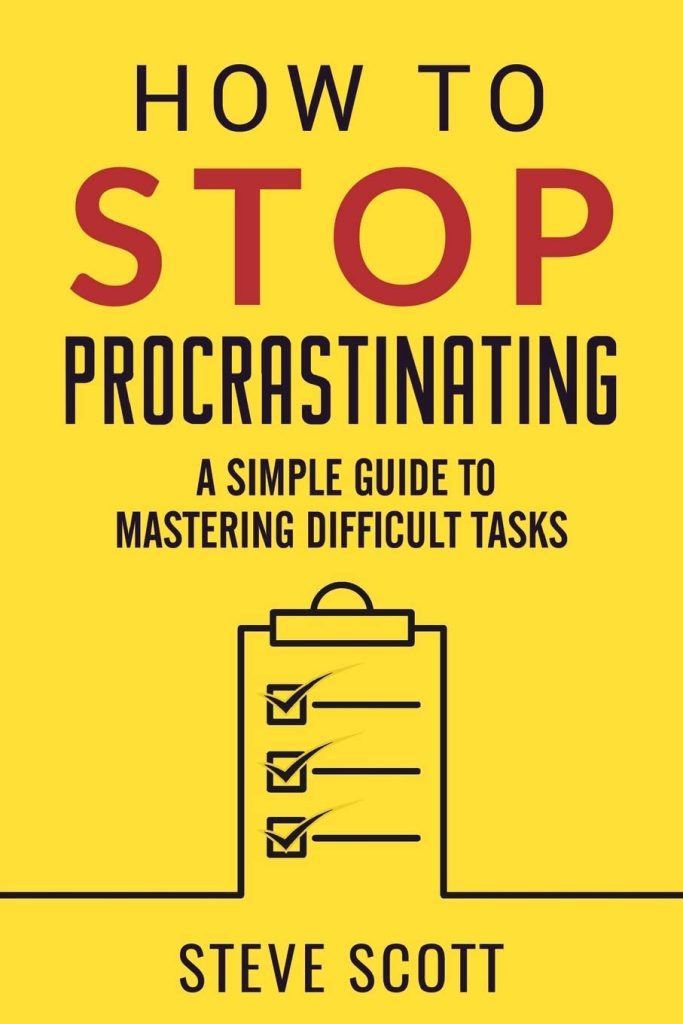
By S.J. Scott
About the Book
This book is a no-nonsense, practical guide to breaking the cycle of procrastination. S.J. Scott dives into the psychology behind why we delay and offers a step-by-step strategy for overcoming it. The book emphasizes action over perfection and provides small, manageable techniques to help you build better habits over time.
Written in a straightforward tone, it’s ideal for readers who want a clear plan to follow without fluff or theory-heavy content.
Key Takeaways from This Book
Identify personal triggers that lead to procrastination
Use “implementation intentions” to plan when and how tasks will be done
Break large tasks into small, actionable steps
Use tools like time-blocking, checklists, and habit tracking
Build a positive feedback loop by celebrating small wins
Avoid distractions and control your environment
Develop discipline through consistent routines
How This Book Is Effective for Time Management
Procrastination is one of the biggest time-wasters, and this book goes straight to the heart of the issue. By addressing both the mental and practical sides of procrastination, it helps you take back control of your schedule. The methods are easy to apply and especially useful for anyone struggling with focus or starting tough tasks.
10. Four Thousand Weeks: Time Management for Mortals
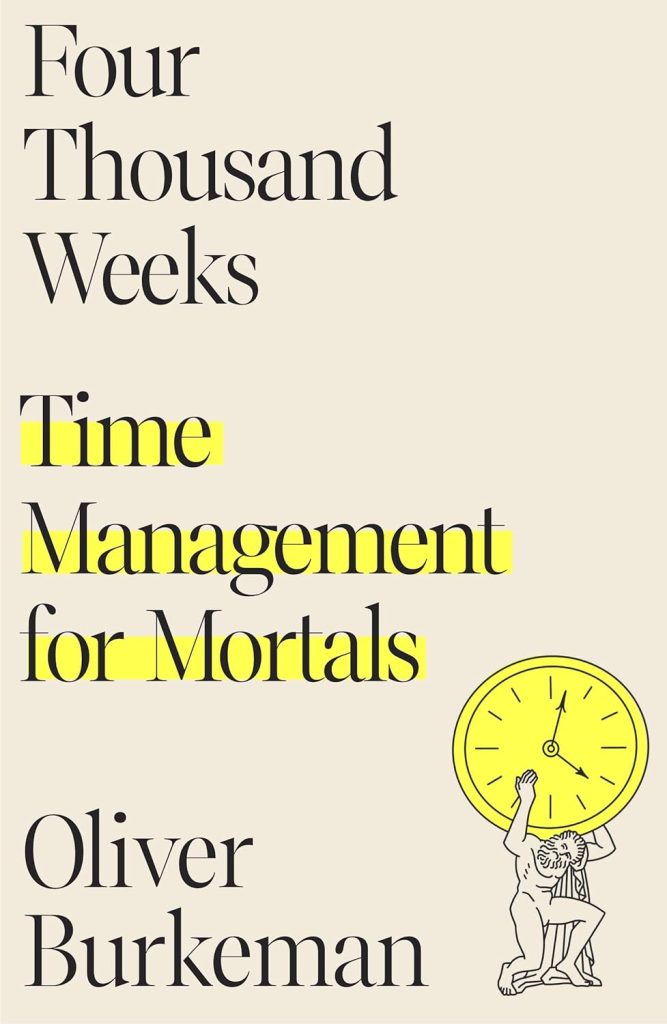
By Oliver Burkeman
About the Book
Four Thousand Weeks takes a philosophical approach to time management. The title refers to the average human lifespan—roughly 4,000 weeks—and encourages readers to rethink how they approach productivity and purpose. Instead of obsessing over efficiency, Burkeman invites us to embrace limitations and focus on what truly matters.
This book isn’t about doing more; it’s about doing less with more intention. It’s perfect for readers feeling burnt out by hustle culture and craving a more meaningful relationship with time.
Key Takeaways from This Book
Accept the limits of your time—you can’t do everything
Focus on what matters most instead of chasing endless productivity
Let go of perfectionism and the need to control everything
Resist distractions that pull you away from your priorities
Learn to say “no” to protect your time and energy
Create space for deep, purposeful living over constant busyness
Productivity is not the goal—living well is
How This Book Is Effective for Time Management
Unlike traditional time management books, Four Thousand Weeks challenges you to question your priorities and how you use your limited time. It doesn’t offer hacks or routines—it offers perspective. This mindset shift can drastically improve your approach to time, helping you spend it more wisely and intentionally.
Implementing Time Management Strategies with Corexta
Reading time management books gives you the tools and mindset to be more productive—but applying those strategies consistently is where the real magic happens. That’s where Corexta, an all-in-one project management platform, becomes your ultimate productivity partner.
Whether you’re juggling multiple projects, managing a team, or simply trying to stay on top of your personal goals, Corexta helps you turn good intentions into action. Here’s how:
Get More Done in Less Time
Corexta is designed to help you focus on what matters. With built-in prioritization tools, smart task tracking, and customizable dashboards, you can structure your day based on high-impact tasks—just like many of the top productivity books suggest.
Track Your Time
Time tracking in Corexta allows you to monitor how every minute is spent. This helps identify time-wasting habits, analyze productivity patterns, and make better scheduling decisions. It’s the practical way to apply lessons from books like The 80/20 Principle and Deep Work.
Effortless Reminders
Never miss a deadline or forget a priority again. Corexta’s smart reminders keep your schedule on track without overwhelming you. Whether it’s a daily highlight (as seen in Make Time) or a long-term goal, you’ll always stay one step ahead.
Seamless Integrations
Corexta connects smoothly with your favorite tools like Slack, Google Calendar, Trello, and more. This means less time switching between apps and more time getting things done. It’s the ultimate way to streamline your digital workspace.
Time-Saving Templates
With ready-to-use templates for recurring workflows, meetings, content planning, and more, Corexta helps eliminate repetitive setup tasks. It’s a perfect way to implement the “system” mindset found in books like Getting Things Done.
Take Charge of Your Time
And there you have it—the 10 best time management books to help you take control of your schedule, manage tasks with ease, and make the most of your time. These books offer practical strategies to boost productivity and reduce overwhelm.
To take things a step further, consider using a smart productivity tool like Corexta. With powerful features like task tracking, team collaboration, and customizable workflows, Corexta complements the timeless insights from these books and helps you apply them effortlessly in daily life.
Be sure to explore our Time Management Matrix and Time Blocking Templates—perfect resources to turn chaotic days into focused, productive routines.
Sign up for free and start mastering your time with confidence today!

